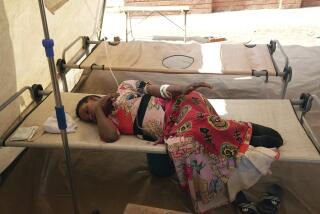Hydration is the key in treating cholera
The cholera outbreak that has killed at least 775 people in Zimbabwe is part of an epidemic that has been afflicting Africa for three decades, according to the U.S. Centers for Disease Control and Prevention.
The disease is the result of a lack of adequate sanitation and water treatment facilities; the high number of deaths results from the near-total breakdown of the healthcare infrastructure in Zimbabwe.
Cholera is an acute diarrheal illness caused by infection by the bacterium Vibrio cholerae. The organism spreads when infected feces enter the water supply and the bacteria are not killed or removed by treatment. Cholera is no longer a problem in industrialized countries, except for the occasional case brought by returning travelers or caused by consumption of inadequately cooked shellfish.
In most people, the infection is mild with few or no symptoms. But about one in 20 victims is stricken with profuse, watery diarrhea, vomiting and leg cramps. That can lead to severe dehydration, shock and death.
The profuse diarrhea contaminates water supplies if the feces enters latrines or directly enters rivers and streams, causing the disease to spread rapidly.
Treatment is simple: rehydration with an oral solution made from a prepackaged mixture of sugar and salts. The most severe cases may require intravenous fluid replacement. Treatment must be started within a couple of hours after symptoms develop, however, and Zimbabwe’s lack of health infrastructure makes that difficult.
Antibiotics such as tetracycline can shorten the course of the illness but generally are not necessary if rehydration is adequate.
A new oral vaccine called Dukoral, manufactured by the Swedish company SBL Vaccin, is available in some countries. The CDC says it appears to provide better protection and has fewer side effects than previous vaccines, but the agency does not recommend it for travelers.
--
More to Read
Sign up for Essential California
The most important California stories and recommendations in your inbox every morning.
You may occasionally receive promotional content from the Los Angeles Times.










